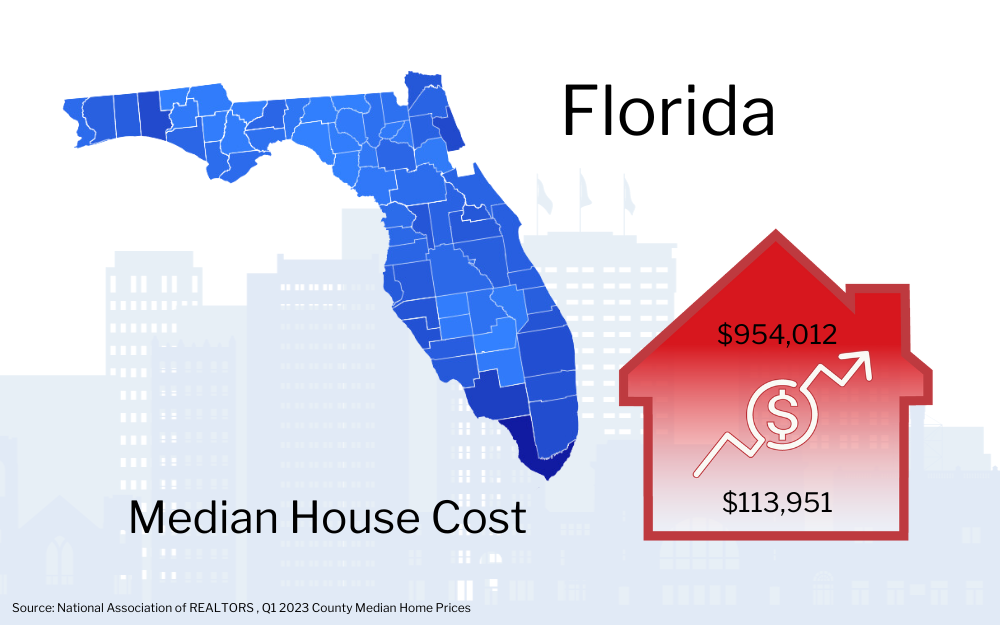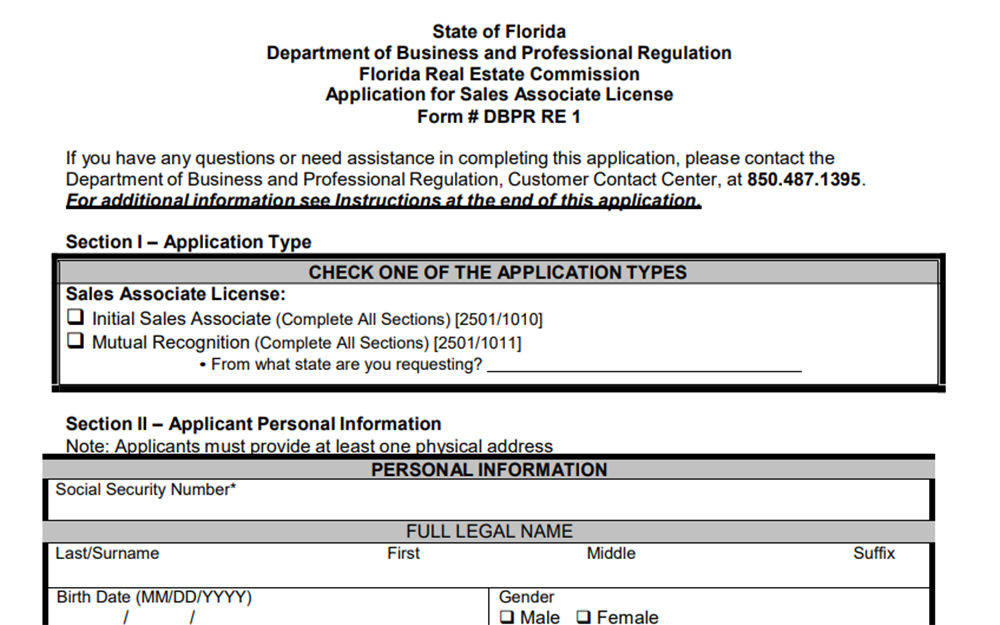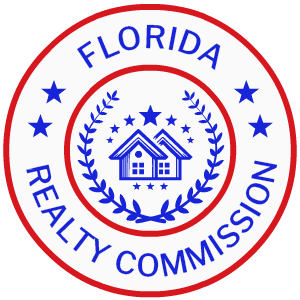
The Florida real estate licensing exam consists of 100 questions.1 Applicants are allotted 3.5 hours to take the test and must receive at least 75%.
According to Florida’s DBPR, only 47% of people pass on the first try.
Real Estate Exam Overview
Florida’s exam is considered among the hardest, and common reasons for poor performance as reported by test-takers include not studying enough and not taking enough practice tests.
Registering for the Test
The first two steps are getting approval to take the test by submitting a real estate licensing application to the DBP and submitting fingerprints for a criminal background check. The Florida Division of Real Estate will then issue approval to take the state exam.
This step may take anywhere from 10 to 30 days.
Once the application has been approved, applicants are contacted by Pearson Vue,2 the testing agency that runs the Florida real estate agent exams, with instructions to register.
You can also reach them at 1-888-204-6289. The fee is $36.75.
The test is not only administered directly in Florida but in centers around the country as well as online. In-person testing in Florida typically takes place M-F between 8 am and 5 pm and on Saturdays between 8 am and 2 pm.
Online exams, which are taken under the observation of a proctor, are available 24/7.
When To Take the Test
While an applicant can take the test anytime within 2 years of completing the pre-licensing course, many course providers recommend taking it within 5 days of finishing the class, or if taking a pre-exam prep course, an optional offering of many programs, within 5 to 10 days of finishing it. Based on past student performance, this appears to offer the best chance of passing.
Real Estate Exam Overview: Contents of Exam
Here is an overview of the real estate licensing exam. The 100 multiple-choice questions are divided as follows:
- Course Overview: The Real Estate Business (1%)
- Real Estate License Law and the Qualifications for Licensure (6%)
- Real Estate License Law And Commission Rules (2%)
- Authorized Relationships, Duties And Disclosure (7%)
- Real Estate Brokerage Activities And Procedures (12%)
- Violations Of License Law, Penalties And Procedures (2%)
- Federal And State Laws Pertaining To Real Estate (4%)
- Property Rights: Estates And Tenancies; Condominiums, Cooperatives, Community Development Districts, Homeowner Associations, And Time-Sharing (8%)
- Title, Deeds And Ownership Restrictions (7%)
- Legal Descriptions (5%)
- Real Estate Contracts (12%)
- Residential Mortgages (9%)
- Types Of Mortgages And Sources Of Financing (6%)
- The Real Estate Markets And Analysis (1%)
- Real Estate Appraisal (8%)
- Real Estate Investments And Business Opportunity Brokerage (2%)
- Taxes Affecting Real Estate (3%)
- Planning, And Zoning (1%)
What To Bring To the Testing Center
Here are the things you should bring:
- 2 forms of ID, one of which must be a government-issued photo ID
- Copy of course completion certificate
- A confirmation number is given when the test is scheduled
When Are Results Available?
The test is administered electronically and results are available immediately.
If You Don’t Pass
Florida allows potential agents unlimited attempts to pass the test. You must wait at least 24 hours to reschedule, and the fee is $57.75.
For a fee of $35, the testing company allows a one-hour review of all of the questions answered incorrectly and the right answers. Utilizing this option, however, means being unable to reschedule the exam for at least 21 days.
Sample Questions
- Which of the following is the correct term for the difference between the total property value and the value of any liens against that property?
a) Down payment
b) Basis
c) Investment
d) Equity
- Chris Smith has a four-story building that is 150 feet x 200 feet. He subdivided the building into storage bins that are 10 feet x 20 feet. If 20% of each floor is used for the common area, how many storage bins will he have?
a) 600
b) 480
c) 150
d) 120
- Each of the below is an agency relationship except for:
a) The listing broker-seller relationship
b) The real estate salesperson-buyer relationship
c) The real estate broker-buyer relationship
d) None of the above—they are all agency relationships
- Which statement best describes the fiduciary duty of a salesperson who works for a broker?
a) They have a fiduciary duty to the broker and all clients of the brokerage firm
b) They have a fiduciary duty to only their broker
c) They have a fiduciary duty to only their own clients
d) They have a fiduciary duty to all clients of the brokerage firm
- Transferring ownership, as defined by legal precedent, or the intention of having a deed be effective and operative, is manifested by the:
a) Notary of the deed
b) Recording of the deed
c) Delivery of the deed
d) Acceptance of the deed
Answers: 1. d, 2. b, 3. b, 4. a, 5. c.
Navigating the Florida Bureau of Real Estate Services License Application in Five Steps
The process of becoming a Florida real estate–once you determine you meet minimum eligibility criteria such as minimum age and education requirements– agent boils down to these five steps.

Step 1: Take the required 63 hours of pre-licensing education.
Step 2: Arrange for fingerprinting for the required criminal background check.3 There are numerous LiveScan service providers throughout the state. Do this at least 5 days before submitting the application so the results are immediately available to the department once your application is received.
Step 3: Apply for licensure and approval to sit for the real estate exam by submitting your application to the Florida Department of Business and Regulation.4
Step 4: Pass the state exam.
Step 5: Find a sponsoring broker. A licensed agent cannot work on their own and must work under a real estate broker.
A real estate license is not officially active until a sponsoring broker submits a particular form to the DBPR.
Costs and Fees To Become a Florida Real Estate Agent
Here are the costs and fees you should know:
- Exam: $36.75
- License Fee: $83.75
- Fingerprinting: $50-$80 depending on service provider
- Pre-Licensing Education: $200-$600 depending on provider
- Post Licensing Education for 1st Renewal: Price varies depending on the provider, but anywhere from $100 to $200
- Association Fees: Joining any real estate associations in the area will come with an application and yearly dues. Initial applications could run up to $200 with yearly dues being $100 or more.
Elective National Association of Realtors® (NAR) Membership Application
Once a licensed agent there is the option to join the largest trade group in the industry, the National Association of Realtors®. The association has a number of local boards in each state and joining one makes you a member on the national level.
There are many advantages to membership such as increased access to resources and networking opportunities, and discounts on various products and services.
Realtors® are held to a higher code of ethics and conduct so membership in this organization may make you more appealing to potential customers.
The National Association of Realtors® has created some guidelines for membership that may or may not be fully adopted by individual boards on the local level. Some examples of membership criteria include having an active license, no record of civil judgments in the last 7 years, and completion of the association’s orientation course.
Check with the local board for a listing of its criteria.
Learn more about membership by visiting the National Association of Realtors® website.5
What’s the Expected Timeline for the Real Estate Application Process?
On average, becoming a Florida agent will take anywhere from 2-5 months. The biggest factor will be how quickly you complete the pre-licensing education.
The DBPR typically takes about 10 days to approve the application for examination and licensure.
It takes about 3 to 5 days for the FDLE to send the results of the background check to the DBPR.6
Once you pass the exam, the department will issue an ‘inactive’ license within 7 to 10 business days.
The license will not become active until an agent sends an activation application to the FREC after securing a job with a sponsoring broker.
References
1Florida Department of Business and Professional Regulation. (2023, January). CANDIDATE INFORMATION BOOKLET Real Estate Sales Associate Examination. myfloridalicense. Retrieved October 26, 2023, from <http://www.myfloridalicense.com/dbpr/servop/testing/documents/RE_sales_cibs.pdf>
2Pearson Education Inc. (2023). Florida Real Estate. Pearson VUE. Retrieved October 26, 2023, from <https://home.pearsonvue.com/fl/realestate>
3Florida Department of Law Enforcement. (2023). Current Registered LiveScan Submitters. Florida Department of Law Enforcement. Retrieved October 26, 2023, from <https://www.fdle.state.fl.us/Criminal-History-Records/Registered-LiveScan-Submitters>
4Florida Department of Business and Regulation. (2023). Sales Associate Initial Application (RE 1). THE OFFICIAL SITE OF THE FLORIDA DEPARTMENT OF BUSINESS & PROFESSIONAL REGULATION. Retrieved October 26, 2023, from <https://www.myfloridalicense.com/CheckListDetail.asp?SID=&xactCode=1010&clientCode=2501&XACT_DEFN_ID=744>
5National Association of REALTORS®. (2023). Who Is a Member of the National Association of REALTORS®? National Association of REALTORS. Retrieved October 26, 2023, from <https://www.nar.realtor/membership/how-to-join-nar>
6Florida Department of Law Enforcement. (2023). How can we help you today? Florida Department of Law Enforcement Homepage. Retrieved October 26, 2023, from <https://www.fdle.state.fl.us/>
7Florida Real Estate Commission. Application for Sales Associate License Form. myfloridalicense. Retrieved December 8, 2023, from <https://www2.myfloridalicense.com/re/documents/DBPR_RE_1_Sales_Associate_Application.pdf>
